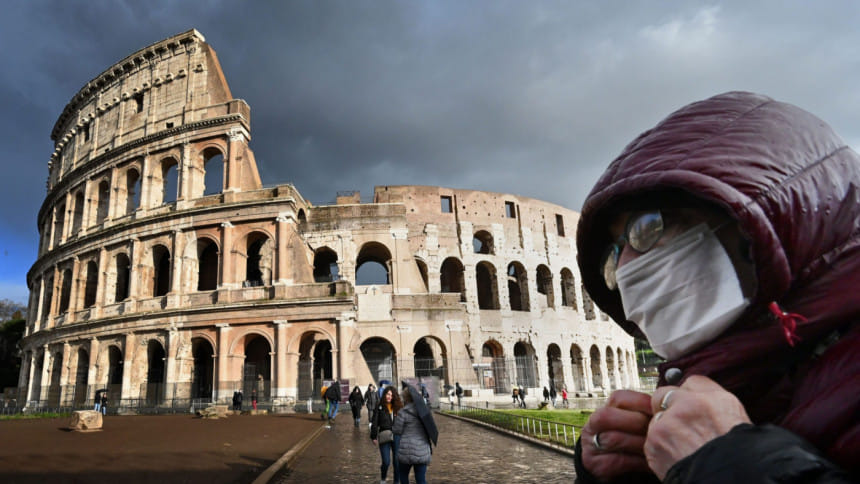Coronavirus and the dark side of globalisation

The coronavirus outbreak—which seems straight out of the sci-fi thriller Contagion—has led to over 7,989 deaths and 198,736 cases worldwide. As we try to make sense out of truths that seem stranger than fiction, the WHO-declared pandemic has laid bare the fact that in an era where globalisation reigns supreme, infectious diseases no longer simply pose the risk of transnational movement of bacterial and viral infections.
The spread of infectious diseases can have far-reaching consequences for minorities and migrants. Numerous stories of Asian minority communities being subjected to racist and xenophobic attacks—both verbal and physical—in countries such as the US, the UK and Australia, have come to light.
Jonathan Mok, a 23-year-old Singaporean, was walking on Oxford Street in London when he faced a violent attack at the hands of four men who punched and kicked him as they barked "we don't want your coronavirus in our country". Dr Rhea Liang, a surgeon in the Gold Coast in Australia, posted information on social media about a patient who joked about not shaking her hand due to the coronavirus (Dr Liang had never left the country).
The two examples above may be quite dissimilar—one, an overtly violent, xenophobic attack and the other, racism in the garb of (bad) humour. But they are both premised on the same worldview: a fear of the "other".
It may seem hard to understand why public fears about migrants and minorities get stoked so easily in an age of cultural assimilation. But these reactions are actually a logical result of the hateful political and media rhetoric systematically fed to people by dehumanising migrants and refugees. Diseases like COVID-19 serve as a trigger of global anxieties that people are conditioned to harbour when it comes to "job-stealing" migrants. So when the opportunity strikes, "model minorities" can quickly be reminded where they "truly belong".
Pandemics, at this day and age, can also serve as political ammunition for powerful countries—putting at stake the principles of multilateralism, free trade and open borders that come with globalisation—lending some credence to prevailing "deglobalisation trends".
It didn't take long for COVID-19 to become a politically charged issue. The US and China are now quarrelling over what to call the virus. Senior US officials like Secretary of State Mike Pompeo have been using the labels "Wuhan virus" or "Chinese coronavirus", while some Chinese officials are floating conspiracy theories about the US military bringing the coronavirus to Wuhan. Chinese Foreign Ministry spokesman Zhao Lijian shared a video on Twitter of Robert Redfield, the director for the US Centers for Disease Control and Prevention, addressing a US Congressional committee on March 11. Lijian wrote: "When did patient zero begin in US? How many people are infected? What are the names of the hospitals? It might be US army who brought the epidemic to Wuhan. Be transparent! Make public your data! US owe us an explanation!"
The politicisation of COVID-19—based on speculation and fear-mongering—not only provides cheap fodder for news outlets but, more importantly, it is the opposite of what the world needs right now. What we need is composure, clear-headedness and proactiveness from world leaders and diplomats to prevent more fatalities as a result of the virus. Successfully tackling the coronavirus will require countries to put their differences aside and work together.
In the age of globalisation—at a time when supply chains the world over are highly complex and integrated—pandemics can severely affect developing countries such as Bangladesh. Bangladesh's over-reliance on China for trade is a major cause for concern and it yet again highlights the urgent need for diversification of our export basket which economists in the country have been crying hoarse over.
But let's put aside the economic aspect. One of the biggest worries for us right now is the lack of implementation of precautionary measures following the return of Bangladeshi migrants from Italy (which has become the epicentre of COVID-19 in Europe) and Gulf states. This newspaper reported on Monday that 349 Italy returnees have been allowed to go home, supposedly to be under the supervision of local administrations whose job it is to ensure that these people follow the rules of "self-quarantine". But many are already flouting the rules. One suspected patient even ran away from the hospital. Many of these expats, who have not been tested for the virus, have returned to their hometowns in the rural areas.
Even though Bangladesh has recorded a miniscule number of cases (about 14 as of March 18) compared to other countries and one death, we have serious reason to worry simply because we do not have the health infrastructure and resources to cope with a crisis that will likely ensue should the virus rapidly spread throughout the country. This is not an unlikely scenario given the lack of awareness among people about preventive measures and our general neglect for health, wellbeing and personal hygiene. Even the US reportedly does not have the testing capacity and sufficient resources (such as ventilators and masks) across the country, and the US Centers for Disease Control and Prevention has come under severe criticism for its slow response to the outbreak. Two emergency doctors in the US are in critical condition because of coronavirus—which shows the vulnerability of frontline health workers.
Have we given any of this a thought? What is our contingency plan? How exactly would we implement such a plan? For example, how would we enforce "social distancing"—which is being encouraged in countries like the US—in the urban slums of one of the most densely populated countries in the world?
While the novel coronavirus itself is largely a result of a globalised world, it has, at the same time, exposed the dark sides of globalisation: racism and ignorance, toxic politics, and the lack of capacity of health systems to forecast or manage pandemics.
In his brilliant speech in the World Economic Forum in Davos in 1999, Kofi Annan, in urging the world to make the "right choice", presciently said: "Globalisation is a fact of life. But I believe we have underestimated its fragility."
Nahela Nowshin is a graduate student of development studies.

 For all latest news, follow The Daily Star's Google News channel.
For all latest news, follow The Daily Star's Google News channel. 



Comments